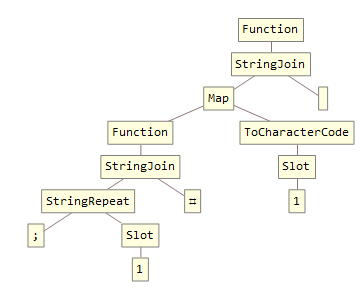37
4
Related to: Make a ;# interpreter
In the above linked challenge the task was to create an interpreter for the esoteric language ;#.
The ;# language
The language has exactly two commands: ; and # (all other characters are ignored by the interpreter):
;: Increment the accumulator
#: Modulo the accumulator by 127, print the corresponding ASCII character and reset the accumulator to 0.
Challenge
Because I am lazy but still want to test some more testcases, I need a program or function which converts plain text to ;# code.
Input
The input is a string, taken either as argument or through stdin. It will only contain printable ASCII characters and newlines.
Output
The output is the generated ;# program by returning, or printing to stdout. As long as the program is valid, it may contain excess characters other than # and ; as all other characters are ignored.
Examples
Input: Hello, World!
Output: ;;;;;;;;;;;;;;;;;;;;;;;;;;;;;;;;;;;;;;;;;;;;;;;;;;;;;;;;;;;;;;;;;;;;;;;;#;;;;;;;;;;;;;;;;;;;;;;;;;;;;;;;;;;;;;;;;;;;;;;;;;;;;;;;;;;;;;;;;;;;;;;;;;;;;;;;;;;;;;;;;;;;;;;;;;;;;;#;;;;;;;;;;;;;;;;;;;;;;;;;;;;;;;;;;;;;;;;;;;;;;;;;;;;;;;;;;;;;;;;;;;;;;;;;;;;;;;;;;;;;;;;;;;;;;;;;;;;;;;;;;;;#;;;;;;;;;;;;;;;;;;;;;;;;;;;;;;;;;;;;;;;;;;;;;;;;;;;;;;;;;;;;;;;;;;;;;;;;;;;;;;;;;;;;;;;;;;;;;;;;;;;;;;;;;;;;#;;;;;;;;;;;;;;;;;;;;;;;;;;;;;;;;;;;;;;;;;;;;;;;;;;;;;;;;;;;;;;;;;;;;;;;;;;;;;;;;;;;;;;;;;;;;;;;;;;;;;;;;;;;;;;;#;;;;;;;;;;;;;;;;;;;;;;;;;;;;;;;;;;;;;;;;;;;;#;;;;;;;;;;;;;;;;;;;;;;;;;;;;;;;;#;;;;;;;;;;;;;;;;;;;;;;;;;;;;;;;;;;;;;;;;;;;;;;;;;;;;;;;;;;;;;;;;;;;;;;;;;;;;;;;;;;;;;;;#;;;;;;;;;;;;;;;;;;;;;;;;;;;;;;;;;;;;;;;;;;;;;;;;;;;;;;;;;;;;;;;;;;;;;;;;;;;;;;;;;;;;;;;;;;;;;;;;;;;;;;;;;;;;;;;#;;;;;;;;;;;;;;;;;;;;;;;;;;;;;;;;;;;;;;;;;;;;;;;;;;;;;;;;;;;;;;;;;;;;;;;;;;;;;;;;;;;;;;;;;;;;;;;;;;;;;;;;;;;;;;;;;;#;;;;;;;;;;;;;;;;;;;;;;;;;;;;;;;;;;;;;;;;;;;;;;;;;;;;;;;;;;;;;;;;;;;;;;;;;;;;;;;;;;;;;;;;;;;;;;;;;;;;;;;;;;;;#;;;;;;;;;;;;;;;;;;;;;;;;;;;;;;;;;;;;;;;;;;;;;;;;;;;;;;;;;;;;;;;;;;;;;;;;;;;;;;;;;;;;;;;;;;;;;;;;;;;;#;;;;;;;;;;;;;;;;;;;;;;;;;;;;;;;;;#
Input: ABC
Output: ;;;;;;;;;;;;;;;;;;;;;;;;;;;;;;;;;;;;;;;;;;;;;;;;;;;;;;;;;;;;;;;;;#;;;;;;;;;;;;;;;;;;;;;;;;;;;;;;;;;;;;;;;;;;;;;;;;;;;;;;;;;;;;;;;;;;#;;;;;;;;;;;;;;;;;;;;;;;;;;;;;;;;;;;;;;;;;;;;;;;;;;;;;;;;;;;;;;;;;;;#
Input: ;#
Output: ;;;;;;;;;;;;;;;;;;;;;;;;;;;;;;;;;;;;;;;;;;;;;;;;;;;;;;;;;;;#;;;;;;;;;;;;;;;;;;;;;;;;;;;;;;;;;;;#
Leaderboard
var QUESTION_ID=122139,OVERRIDE_USER=73772;function answersUrl(e){return"https://api.stackexchange.com/2.2/questions/"+QUESTION_ID+"/answers?page="+e+"&pagesize=100&order=desc&sort=creation&site=codegolf&filter="+ANSWER_FILTER}function commentUrl(e,s){return"https://api.stackexchange.com/2.2/answers/"+s.join(";")+"/comments?page="+e+"&pagesize=100&order=desc&sort=creation&site=codegolf&filter="+COMMENT_FILTER}function getAnswers(){jQuery.ajax({url:answersUrl(answer_page++),method:"get",dataType:"jsonp",crossDomain:!0,success:function(e){answers.push.apply(answers,e.items),answers_hash=[],answer_ids=[],e.items.forEach(function(e){e.comments=[];var s=+e.share_link.match(/\d+/);answer_ids.push(s),answers_hash[s]=e}),e.has_more||(more_answers=!1),comment_page=1,getComments()}})}function getComments(){jQuery.ajax({url:commentUrl(comment_page++,answer_ids),method:"get",dataType:"jsonp",crossDomain:!0,success:function(e){e.items.forEach(function(e){e.owner.user_id===OVERRIDE_USER&&answers_hash[e.post_id].comments.push(e)}),e.has_more?getComments():more_answers?getAnswers():process()}})}function getAuthorName(e){return e.owner.display_name}function process(){var e=[];answers.forEach(function(s){var r=s.body;s.comments.forEach(function(e){OVERRIDE_REG.test(e.body)&&(r="<h1>"+e.body.replace(OVERRIDE_REG,"")+"</h1>")});var a=r.match(SCORE_REG);a&&e.push({user:getAuthorName(s),size:+a[2],language:a[1],link:s.share_link})}),e.sort(function(e,s){var r=e.size,a=s.size;return r-a});var s={},r=1,a=null,n=1;e.forEach(function(e){e.size!=a&&(n=r),a=e.size,++r;var t=jQuery("#answer-template").html();t=t.replace("{{PLACE}}",n+".").replace("{{NAME}}",e.user).replace("{{LANGUAGE}}",e.language).replace("{{SIZE}}",e.size).replace("{{LINK}}",e.link),t=jQuery(t),jQuery("#answers").append(t);var o=e.language;/<a/.test(o)&&(o=jQuery(o).text()),s[o]=s[o]||{lang:e.language,user:e.user,size:e.size,link:e.link}});var t=[];for(var o in s)s.hasOwnProperty(o)&&t.push(s[o]);t.sort(function(e,s){return e.lang>s.lang?1:e.lang<s.lang?-1:0});for(var c=0;c<t.length;++c){var i=jQuery("#language-template").html(),o=t[c];i=i.replace("{{LANGUAGE}}",o.lang).replace("{{NAME}}",o.user).replace("{{SIZE}}",o.size).replace("{{LINK}}",o.link),i=jQuery(i),jQuery("#languages").append(i)}}var ANSWER_FILTER="!t)IWYnsLAZle2tQ3KqrVveCRJfxcRLe",COMMENT_FILTER="!)Q2B_A2kjfAiU78X(md6BoYk",answers=[],answers_hash,answer_ids,answer_page=1,more_answers=!0,comment_page;getAnswers();var SCORE_REG=/<h\d>\s*([^\n,]*[^\s,]),.*?(\d+)(?=[^\n\d<>]*(?:<(?:s>[^\n<>]*<\/s>|[^\n<>]+>)[^\n\d<>]*)*<\/h\d>)/,OVERRIDE_REG=/^Override\s*header:\s*/i;body{text-align:left!important}#answer-list,#language-list{padding:10px;width:290px;float:left}table thead{font-weight:700}table td{padding:5px}<script src="https://ajax.googleapis.com/ajax/libs/jquery/2.1.1/jquery.min.js"></script> <link rel="stylesheet" type="text/css" href="//cdn.sstatic.net/codegolf/all.css?v=83c949450c8b"> <div id="answer-list"> <h2>Leaderboard</h2> <table class="answer-list"> <thead> <tr><td></td><td>Author</td><td>Language</td><td>Size</td></tr></thead> <tbody id="answers"> </tbody> </table> </div><div id="language-list"> <h2>Winners by Language</h2> <table class="language-list"> <thead> <tr><td>Language</td><td>User</td><td>Score</td></tr></thead> <tbody id="languages"> </tbody> </table> </div><table style="display: none"> <tbody id="answer-template"> <tr><td>{{PLACE}}</td><td>{{NAME}}</td><td>{{LANGUAGE}}</td><td>{{SIZE}}</td><td><a href="{{LINK}}">Link</a></td></tr></tbody> </table> <table style="display: none"> <tbody id="language-template"> <tr><td>{{LANGUAGE}}</td><td>{{NAME}}</td><td>{{SIZE}}</td><td><a href="{{LINK}}">Link</a></td></tr></tbody> </table>
9Brilliant! Glad to see ;# is getting attention! – caird coinheringaahing – 2017-05-23T06:41:30.340
1
You can test your output here, as ;#+ is a superset of ;#.
– Adám – 2017-05-23T07:02:38.213@Adám I'll be damned, it's already on TIO – kalsowerus – 2017-05-23T07:14:21.677
3Can the output contain additional character?
;#ignores all other characters, so the generated program would still work. – Dennis – 2017-05-23T07:23:07.0031@Dennis Yes it can – kalsowerus – 2017-05-23T07:26:25.643
1When the input contains a newline, do you need the output to contain 13
;and a#? – Chowlett – 2017-05-23T08:21:24.527@Chowlett Well, depends on what newline sequence was used in the input.
\nshould be 10;and\rshould be 13;. – kalsowerus – 2017-05-23T08:37:45.397Uh, yes. I meant 10. <.<; – Chowlett – 2017-05-23T08:43:44.093
None of the answers implement the modulus you've aksed (and I think you meant % 128). – Benoît – 2017-05-24T04:37:04.303
2@Benoît: The modulus is irrelevant when generating code, since it's always easier to generate code that uses the minimum number of
;. Secondly, 127 is correct, as stated in the linked question that contains the specification of the ;# language. – Joey – 2017-05-24T07:16:31.770Can you edit the fact that the output may contain additional characters other than
;and#into the question, please? A few people, myself included, may be able to save some bytes with that knowledge. – Shaggy – 2017-05-24T11:40:59.920@Shaggy: But that is part of the question; you're supposed to output valid ;# code and in ;# code anything except
;or#is simply ignored. Thus you can have other characters in it, as they don't change the validity of the ;# program. – Joey – 2017-05-24T13:54:32.227@Joey, the fact that "all other characters are ignored" is mentioned in the intro doesn't necessarily explicitly permit any other characters in the output. – Shaggy – 2017-05-24T13:57:08.077
2This isn't really transpiling. "Generate #; code" is a better title. I'm going to change it to that. – Mego – 2017-05-24T20:24:32.240
Can we take input as an array of individual characters? – Shaggy – 2017-05-25T18:10:22.600
@Shaggy Sorry for the (very) late answer. The input should be taken as a string, I will clarify this. – kalsowerus – 2017-05-29T06:20:23.333